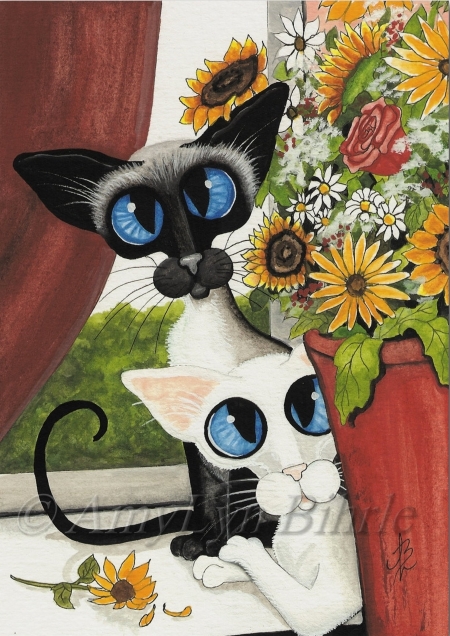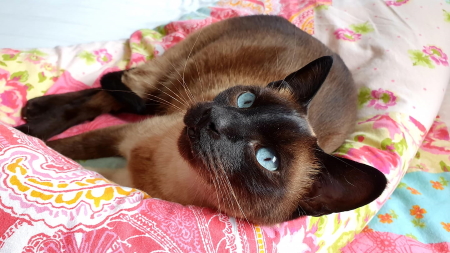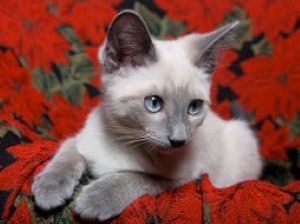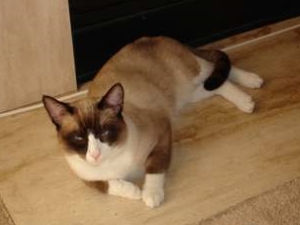- Home
- Meezer Musings
- August 2019
Meezer Musings: August 2019
A (very) warm welcome!
"Summertime, and the livin' is easy,
Fish are jumpin' and the cotton is high"
G. & I. Gershwin, D. Heyward. Summertime
It's high summer in the northern hemisphere and for many of us that has meant sweltering heat. Several European countries, including Belgium, Germany, the Netherlands and the UK recorded their highest-ever temperatures in July and there are similar stories from other parts of the world.
Accordingly, this month's Meezer Musings includes our topical tips for keeping your cats cool when temperatures are soaring, and (not entirely by coincidence) our Meezer of the Month comes from the Netherlands - a very handsome boy called Yorick, who you'll meet below.
In our previous newsletter we looked back at some of the delightful rescue stories we've received over the years. This time we're investigating something completely different, Siamese cat health, and in particular those medical issues that seem to affect Siamese cats more often than other breeds.
 Siamese & Oriental Cats with Summer Flowers
Siamese & Oriental Cats with Summer FlowersImage with thanks to and copyright © AmyLyn Bihrle
Prints from an original painting available on Etsy
Welcome to Our New Subscribers
A Facebook post by Siri Zwemke, of the Siamese Cat Rescue Center of Virginia, led to a number of new sign-ups to Meezer Musings (thank you Siri!) and we extend a warm welcome to all of you.
You may be seasoned Siamese cat owners of many years standing, or you may be relatively new to Siamese cats.
Our topics are varied and aimed at all Siamese cat lovers and while we do, of course, hope you stay with us, our newsletters may not suit everyone. You can of course unsubscribe at any time, using the link at the bottom of the email we sent you.
I'm delighted to say that the number of subscribers to this newsletter is now well over 2000, so to old and new subscribers alike, thank you for being here!
Siamese Cat Health – Genetic Issues
I've always thought of the Siamese as a healthy breed, and many Siamese cats live long, untroubled lives. The average Siamese lifespan is around fifteen years but some continue on, in reasonably good health, into their twenties.
Our main topic this month came into being after a post on our Facebook page from an owner whose cat is undergoing treatment for mast cell tumors. It seems there's a high incidence of mast cell cancer in Siamese cats, and I was curious to find out more about the diseases that affect Siamese cats more often than other breeds.
The information that follows outlines those disorders which, according to research by veterinary practitioners, geneticists and insurance companies, are either hereditary or to which Siamese cats seem particularly prone. These fall broadly into the following areas:
- Mouth and gums
- Lungs
- Heart
- Digestive tract
- Pancreas and liver
- Kidneys
- Cancers
You'll find more about each of these areas below, although I've tried to keep each section as short as possible - detailed information on each of these disorders would need pages!
It's important to remember that just because, as a breed, Siamese cats seem particularly
susceptible to certain illnesses, this doesn't mean that you'll come across all of them in every Siamese cat. These issues may seem alarming, but in a whole lifetime you may never come across any of them.
It's as well to be prepared, though. Sadly, as I was finishing up this newsletter, the beautiful photo below was posted to our Facebook page by visitor Kelly.
Kelly lost Charlie to intestinal lymphoma (one of the cancers described) last November, and was understandably heartbroken at his loss. Our condolences to Kelly and to anyone else who's lost a cat to any of these diseases.
 In Memory of Charlie
In Memory of CharlieImage with thanks to and copyright © Kelly Drover
Mouth and Gums
According to one of the major pet insurance companies, Petplan, problems in the mouth are among the most common health issues seen in Siamese cats.
We covered dental and other oral issues back in March so I won't go into these in detail here (link below if you'd like to learn more) but as Siamese cats are particularly prone to gum disease and other dental problems, it's well worth learning what to look out for and how you can help your cat avoid any major issues. Read more here.
Lungs
Siamese cats seem to be more prone than other breeds to asthma and chronic obstructive pulmonary disease (COPD), both of which involve inflammation and narrowing of the small airways of the lungs.
This makes breathing difficult - cats with asthma or COPD tend to have a wheezing, gasping cough. Causes can include exposure to irritants such as tobacco smoke, air pollutants or allergens, but respiratory problems can also result from dental disease or recurrent infections.
Getting prompt advice and treatment is essential, as leaving the symptoms untreated may make things a whole lot worse.
Breathing difficulties in cats can be serious and potentially life-threatening, so recurring or persistent coughing or wheezing should always be checked out by a vet, who may prescribe oral medications or inhalers.
Heart
There are two types of heart disease in cats - congenital, which the cat is born with, and acquired, when the disease develops during the cat's lifetime.
Congenital heart diseases include defects of the heart wall, the heart valves or the blood vessels. Siamese cats are particularly prone to one of these, a disease called hypertrophic cardiomyopathy or thickening of the heart, which doesn't always have an obvious cause and may be genetic.
This thickening results
in the heart being less able to pump blood effectively and may eventually lead to heart failure. Unfortunately, the condition isn't curable but can be treated with regular, lifetime medication.
Gastrointestinal Tract Disorders
Again according to Petplan, the Siamese is the breed most likely to need treatment for gastrointestinal (GI) or digestive issues.
The digestive tract is effectively a long tube, with food entering at one end and being expelled as waste at the other. Problems can arise through infection, poisoning, or obstruction, either from tumors or through eating indigestible matter.
Any of the above cause vomiting and/or diarrhea. Depending on the cause, most gastrointestinal conditions are treatable, and it goes without saying that diarrhea and persistent vomiting should always be followed up with a vet visit.
Pancreas and Liver
The pancreas, liver and kidneys all form part of the digestive system, and as with GI tract issues, Siamese cats seem particularly prone to problems in these areas.
Pancreatitis, or inflammation of the pancreas, is commonly seen in Siamese cats. It's an extremely painful condition that caused by infection, parasites, trauma or drug reactions. Treatment may include antibiotics, anti-inflammatories, fluids and pain relief.
Amyloidosis is a genetic disorder in which proteins (the building blocks of the body) develop abnormally, creating tough, fibrous folded protein substances called amyloids which are deposited in various organs, displacing normal cells. This can affect any organ, but in Siamese cats this tends to happen most often in the liver. Over time, the liver becomes damaged and eventually stops working.
Signs of amyloidosis include excessive thirst, lethargy, lack of appetite, vomiting and diarrhea and jaundice. Unfortunately the condition is incurable, although in the early stages it is possible to treat the symptoms.
Kidneys
The job of the kidneys is to filter waste products from the blood into the urine. As they age, all cats become more prone to chronic kidney disease (CKD) in which kidney function deteriorates over time, but this seems to be more commonly seen in Siamese cats than other breeds.
Kidney disease is often associated with dental problems (which, as we've seen, is another very common issue in Siamese cats) so it's really important to keep an eye on oral health as bacteria from infected gums can spread and cause kidney and liver damage.
Symptoms of kidney disease include excessive thirst, frequent, cloudy or bloody urination, bladder and kidney infections, loss of appetite and weight loss, vomiting, bad breath and mouth ulcers.
Kidney disease is confirmed by blood and urine tests and is irreversible, but can be kept at bay, sometimes for years, with special diets and medication.
NB: It's important to note that there are two types of kidney disease - acute and chronic. Acute kidney disease may arise at any age from an infection or blockage, or from ingesting toxic substances like anti-freeze or some plants (particularly lilies), whereas chronic kidney disease tends to be age-related and is a progressive deterioration over time.
Cancers
The threat of cancer becomes more likely for all cats as they age but there are some cancers that seem to affect Siamese cats more often than others.
These are:
Adenocarcinoma
Adenocarcinomas are intestinal cancers that tend to wrap around the intestines, blocking the flow of the digestive process, leading to sudden vomiting, diarrhea and bloody stools. They may be detected through routine examinations, but an ultrasound scan is usually needed to confirm the diagnosis and prepare a surgical plan for the removal of the tumor.
Mast cell tumors
Mast cell tumors are a type of skin cancer, which may be either benign or malignant. Malignant mast cell tumors must be removed, and if caught early, may be cured, so any suspicious skin growths should be checked out by a vet as soon as you notice them.
Lymphoma
Lymphoma is a cancer that affects a certain type of white blood cells. White blood cells travel around the body in the lymph, which means that lymphoma can show up anywhere in the body although there are three main sites, the most common of which is the digestive tract - intestinal lymphoma.
Lymphoma is diagnosed through observation and blood tests, and may be treated with surgery and / or chemotherapy. It is not curable, so the aim of treatment is to get the cancer into remission. Results will depend on how early the cancer is detected and how far it has spread and the general health of the cat.
References
Calvert Animal Hospital
https://www.calvertanimal.com/client-resources/breed-info/siamese-2/
People's Dispensary for Sick Animals
https://www.pdsa.org.uk/looking-after-your-pet/siamese
Petplan
https://www.petplan.co.uk/pet-information/cat/breed/siamese/
Topical Tips for Summer Heat
Cats usually enjoy warm weather and are fairly heat tolerant, but can suffer from dehydration and heatstroke when temperatures soar.
With that in mind, here are ten tips for keeping your cat cool, healthy and happy in the summer months.
- Supply plenty of fresh cold water. This is always important, but in hot weather water evaporates very quickly. Check bowls regularly; clean them out and fill them up. Some cats like ice cubes
added to their water, some don't, so to experiment, provide a choice of iced and non-iced water. Don't use too
much ice though - one or two cubes is plenty to keep the water fresh without
over-chilling it.
- Feed wet food. Some cats don't drink enough, which can be a problem in hot weather. If you usually feed dry foods, consider switching to wet meals and adding water to them. Many cats love licking gravy, and adding water is a sneaky way of getting more fluid in.
- Provide shade and airflow. Indoors (and outdoors, if your cat's allowed out) make sure there's a cool, quiet, shady area they can retreat to. Keep curtains closed or shades drawn when the sun's on the windows. Rooms with ceiling fans for airflow are helpful too.
- Make cool spots. Many cats love lying on cool, tiled kitchen floors when it's hot, others choose to curl up in sinks, showers or baths. Laying wet towels down in these areas can help. It's possible to buy self-cooling mats for pets, but you can create cool spaces yourself by placing ice packs in cotton pillowcases in places where you cat likes to lie, or filling water bottles with ice cold water and placing them in cardboard boxes for your cat to find and use if they need to.
- Avoid too much play. Exercise generates heat, so keep play to a minimum in hot weather.
- Groom cats daily. In long-haired cats especially, matted fur can trap heat. Fur with no tangles allows air to flow freely through the coat. Daily brushing (for all cats) removes excess fur and helps to keep them cool.
- Check your outside buildings.
Inspect sheds, greenhouses, and summerhouses before closing them up.
Cats often creep inside for shade, but will dehydrate and die very
quickly in hot enclosed spaces without water.
- Avoid parked cars. Never leave cats alone in parked cars. On trips to the vet or on vacation, make sure the cat's in a secure cat carrier, use air-conditioning if you have it, open the windows if you have to park, and stay with the cat to keep an eye on it.
- Check for dehydration. Pinch the skin at the back of your cat's neck - it should spring back immediately. If it doesn't, chances are they're dehydrated. Dehydration can be serious so always seek veterinary advice.
- Watch for signs of heatstroke.
Panting, drooling, vomiting, listlessness or lethargy, dilated pupils
and a rapid heartbeat are all signs of heatstroke. If you notice any of
these things take your cat to the vet immediately. You can help to cool your
cat down on the way by sponging their heads and coats with cold, damp,
towels.
Fun from Facebook | Meezer of the Month
In line with our summer theme, the photo below, posted to our Facebook page last week, was very popular one so this very handsome boy, Yorick, becomes our Meezer of the Month.
Yorick lives with Mirjam Loderus in the Netherlands, which, as I mentioned at the start, has been experiencing record temperatures and Mirjam mentioned that the weather had been extremely hot in her area. Let's hope that both she and Yorick are more comfortable now!
 Yorick
YorickImage with thanks to and copyright © Mirjam Loderus
Tail End ...
This newsletter would normally have gone out a little earlier at the end of July, but I had a bug that knocked me out for a couple of days so it became the August newsletter instead!
I'm going to be taking a break for a little while and will be back with the next Meezer Musings at the end of September. Meanwhile, here's hoping that you and your furbabies stay cool wherever the weather's hot, and warm wherever the weather's cold - have a great August and stay safe, everyone!
Caroline
Missed a Meezer Musings? A list of previous newsletters can be found here.
Some of the articles and newsletters on this site may contain links to products I think you may enjoy. If
you purchase through these links I receive a small commission, but there's
no extra cost to you. Find out more on the Affiliates Disclosure page.
Have You Discovered Our Newsletter?
If not, why not? Subscribe to our email newsletter, Meezer Musings, to stay in touch, be the first to see new information and pages as they come out, and read the things we only talk about in the newsletter.
Learn more about it on our Newsletter Sign-Up page.




